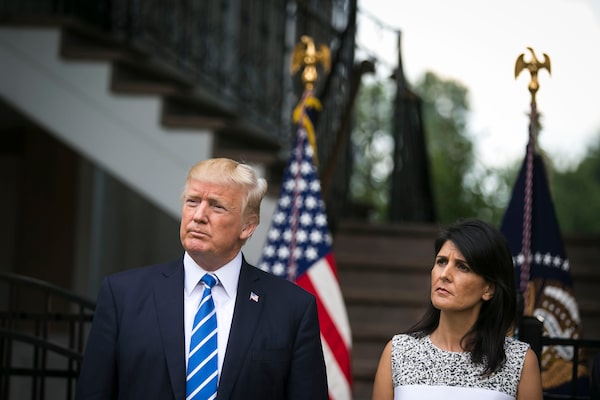
Donald Trump and Nikki Haley during a news conference at Trump National Golf Club in Bedminster, N.J., on Aug. 11, 2017.AL DRAGO/The New York Times News Service
The Great Transition of 2024 is under way in American politics, and the shape of the campaign ahead depends on how deftly Donald Trump and Nikki Haley continue to make adjustments.
As the two candidates for the Republican presidential nomination double down on their efforts in South Carolina – which on Feb. 24 holds its vitally important primary – Mr. Trump is struggling, against his instincts and past practices, to become a unifier while Ms. Haley, battling her own milder style and inclinations, is fighting to become a divider.
And at the same time, Mr. Trump, known for his megaphone voice, is working to cool his speaking style for the general election while Ms. Haley, who speaks in a silky mezzo-soprano, is trying to project a more robust contralto.
Nobody said that presidential politics was easy.
“People’s personalities typically stay constant throughout their lives, but it is possible to change the way that you present yourself,” said Ira Bedzow, an ethicist who is the executive director of the Purpose Project at Emory University in Atlanta. “It takes the knowledge of how to change, practice, and the motivation to do so. Those who are comfortable with the way they present themselves – or who have long-time strategic or tactical reasons to behave a certain way – may find it hard to change.”
Former University of Texas football coach Darrell Royal was famous for saying, “Dance with the one who brung you,” a Southern locution that means sticking with the style that brought initial success. But increasingly it is clear that Mr. Trump and Ms. Haley are recognizing that their original styles – the one a male bully favouring incendiary rhetoric, the other a pioneering woman seeking to project the voice of reason and reconciliation – are unsuited to their tasks ahead, whether it is uniting the Republican Party for the November general election or breaking the hold of the front-runner in the fight for the GOP nomination.
Mr. Trump wants Ms. Haley to surrender and retreat. Ms. Haley has vowed to stay in the race at least for another five weeks – a period when about two-thirds of the states conducting primaries invite voters who aren’t Republicans to participate. When the Republican National Committee floated the idea of declaring Mr. Trump the “presumptive nominee,” he resisted, citing the party unity that he once shattered and arguing on his Truth Social site that he wanted to “finish the process off AT THE BALLOT BOX.”
This is evidence that Mr. Trump, whose rise came in being a figure of division – first profiting from the distribution of votes among multiple rivals for the nomination, then governing without seeking bipartisan compromise or sometimes even GOP unity – realizes that he must get Republicans behind him if he is to prevail against President Joe Biden. That means getting Ms. Haley out of the race, to be sure, but also speaking more broadly about party unity.
And now Ms. Haley – whose survival to emerge as the lone alternative to Mr. Trump came out of her role as a moderate seeking compromise on divisive issues such as abortion – realizes that she has to sharpen the differences with Mr. Trump, to abandon her strategy of avoiding attacks against the former president and to lean into her self-image as a “street fighter in heels” rather than a figure who can heal the party’s divisions.
“Changing your attitude is easier than changing your behaviour – but neither is straightforward, as anyone who has tried and failed at New Year’s resolutions knows all too well,” said Christine Whelan, a clinical professor in the School of Human Ecology at the University of Wisconsin-Madison.
Both candidates face the difficulty of presenting a different profile. But the character of the race itself is also changing. It has moved from the early political tests to states where the campaigning is less intimate and voters are less familiar with the candidates than they were in Iowa and New Hampshire, where campaigning consumed almost a year rather than a few weeks. So the candidates must evolve as well.
Mr. Trump, for example, has long has profited from a style that includes streaks of meanness and streams of misleading statements, reminiscent of Abraham Lincoln’s characterization of his great political rival Stephen A. Douglas, whom he said “will tell a lie to 10,000 people one day, even though he knows he may have to deny it to 5,000 the next.”
Buoyed by an infusion of more than US$4-million since her second-place finish in New Hampshire, Ms. Haley knows she must revert to the style she employed as governor of South Carolina. In that role, she took unpopular stands (signing legislation removing the Confederate battle flag from the State House after nine members of a Black church in Charleston were gunned down) and offered little comfort to her opponents (whom she alienated for, among other reasons, insisting on recorded legislative votes on controversial matters).
“True attitude change necessitates behaviour change – a change of tone, tactics and actions,” Prof. Whelan said. “But it’s something that must come from an internal shift.”
Perhaps it is fitting that this external shift as the campaign moves to South Carolina.
Mr. Trump, who has devoted his political career to fighting the elites, has the nearly unanimous support of the state’s establishment. And there Ms. Haley, though governor for six years, is the outsider blasting the elites. In this campaign, the more things change, the more they don’t remain the same.
 David Shribman
David Shribman